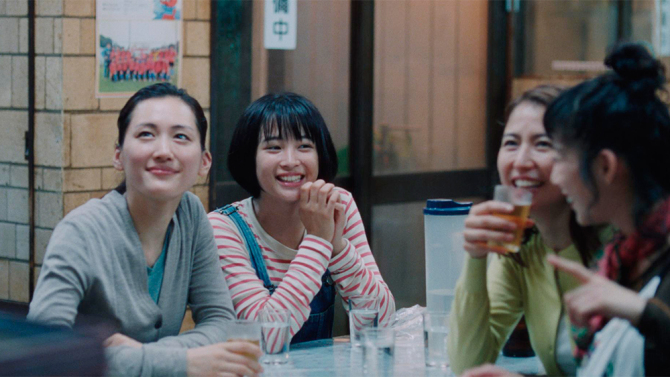By Liz Lopez
Rating: B+
Many people have stories about their childhood when their life was altered by the departure of a parent and the impact it has on their life, either then or in later years. Filmmaker Hirokazu Koreeda (Nobody Knows, I Wish, and 2013 Cannes jury prizewinner Like Father, Like Son) has written, edited and directed Our Little Sister, based on the manga Umimachi Diary by Akimi Yoshida, and it was in competition in the 2015 Cannes Film Festival. This drama with a bit of humor stars four young women at the center of Koreeda’s story where three adult sisters, Sachi (Haruka Ayase), 29, Yoshino (Masami Nagasawa), 22, and Chika (Kaho), 19, live together in Kamakura and learn of their father’s passing while married to his third wife.
It is not long before they learn of the daughter from the second marriage, Suzu (Suzu Hirose), a young teen who is left behind to live in Yamagata with the new widow in unpleasant circumstances. The story is appealing in that despite whatever hard feelings these adults have towards their late father, they recognize the same path Suzu is headed on, similar to theirs, feeling lost and abandoned. Our Little Sister is engaging, has beautiful cinematography and explores each character’s life to various degrees. I recommend this film for both the story and the excellent performances by these actresses.
Everyone has to make changes at home, in their work and school life. For the most part there is not that much drama in the transition, as I had originally anticipated. The eldest, Sachi, is a nurse at the local hospital, working difficult shifts and long hours. She has been caretaker of her younger sisters since their parents’ divorce, and there is little to no mention of their mother, Miyako (Shinobu Otake), until well over half of the film has transpired. Sachi acts like a mother with her sisters, is stern, and does not approve of the suitors their sisters have. Chika (the third sister), is 19 and all over the map; not exactly the mentor for a thirteen year old who is attractive to her fellow students.
Although the story does not delve very deeply into what the three Koda sisters have really been through living without parents for many years, their actions and interactions with men provide clues. The story does not only focus Suzu becoming a young woman, but also reveals the challenges Sachi faces too.
Some very touching scenes are when family traditions are shared with Suzu, including making wine from the 55-year-old plum tree on the family property. When they share memories and pass on the activity shared by generations, I have no doubt it can be an emotional scene for anyone who has lost an elder family member. For many, this is a time when deeper bonds are established and the preservation of family history becomes a priority.
The film is rated PG, has a running time of 126 minutes and is scheduled to open at the Regal Arbor.
Source: Sony Pictures Classics
